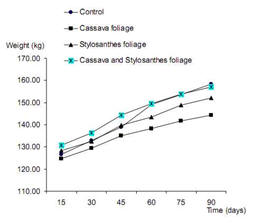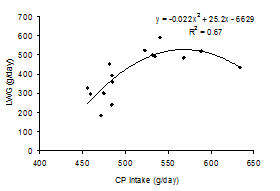
|
 |
| Figure 1: Accumulated live weight of the animals during the experiment | Figure 2: Relationship between live weight gain and CP intake in the groups fed foliages |
|
MEKARN Conference 2010 |
The effect of feeding different levels of cassava foliage (Manihot esculenta Crantz) and/or Stylosanthes guianensis foliage on the growth and digestibility was studied using twenty eight 6-month-old crossbred growing cattle (50% local Yellow cattle and 50% Sindhi) weighing on average 114 kg at start. All animals were fed a basal diet consisting of urea treated rice straw (URTRS) fed ad libitum, 0.87 kg concentrate and 0.22 kg molasses on dry matter (DM) basis. The treatments were four supplements: soybean meal (Control), cassava foliage (CA), stylosanthes foliage (STY) or a mix of of stylosanthes foliage and and cassava foliage (CA-STY), all giving the same nitrogen intake. The consumption of tannins and hydrogen cyanide (HCN) were significantly higher in groups fed a mixture of foliages compared with only cassava foliage, respectively. There were 30% and 19%, respectively, higher live weight gain in the group fed a mixture of foliages as compared to the groups fed only cassava or stylosanthes. The factors of low organic matter and high level of HCN in the diet when feeding only cassava foliage might explain the negative effects on intake, neutral detergent fibre digestibility and nitrogen retention, and resulted in lower growth rates.

|
 |
| Figure 1: Accumulated live weight of the animals during the experiment | Figure 2: Relationship between live weight gain and CP intake in the groups fed foliages |
Keyword: Growing cattle, Cassava foliage, Stylosanthes foliage, Apparent digestibility, Growth rate